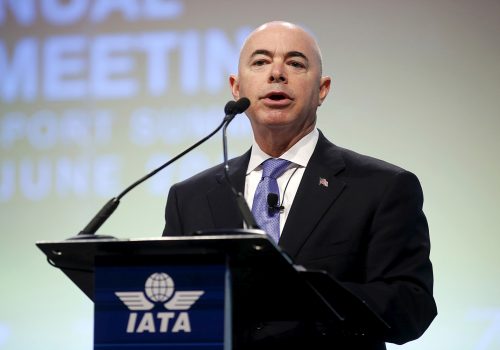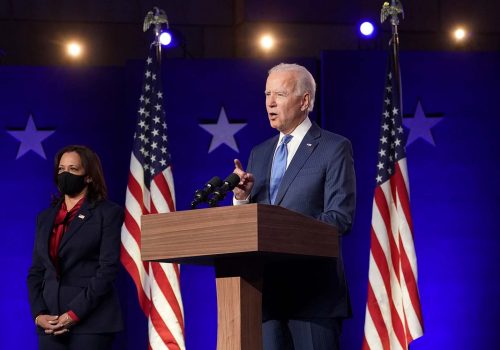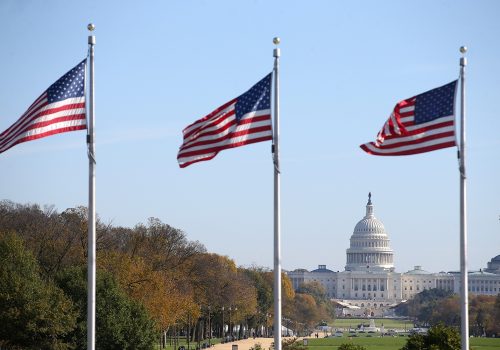FAST THINKING: NATO’s 138-point plan for survival
GET UP TO SPEED
This week’s summit of NATO foreign ministers featured the release of an internal report on what it can do to stay relevant over the next decade. The study comes as the Alliance aims to recover from the drift of the Trump era and grapple with new challenges from Russia and China. As it happens, the Atlantic Council recently completed its own deep dive into big ideas to reimagine the Alliance, many of which get traction in the report. That project was headed by Chris Skaluba, who handled NATO policy during his tenure in the Defense Department. We spoke with him about NATO’s efforts to adapt.
TODAY’S EXPERT REACTION COURTESY OF
- Chris Skaluba: Former senior Defense Department official and director of the Scowcroft Center’s Transatlantic Security Initiative
Why the report matters
- It’s a lot to wade through—Chris calls the report’s whopping 138 recommendations “classic NATO”—but he thinks the timing is right. “It lands forcefully at the sunset of the Trump era, to which in some ways it was meant as a response,” he tells us. He finds the study “equally credible in its strategic sensibility and specific recommendations,” amounting to “a roadmap for a revised NATO grand strategy,” which “you can expect the Secretary General to call for after digesting the report’s findings.”
- Chris thinks the study will give President-elect Biden and his team compelling arguments to support what he sees as their “inc the lination to re-situate NATO as the foundation of American security policy and as the most critical institution for the transatlantic relationship.”
- Among the findings of the report that he highlighted: keeping up pressure on Russia while looking for avenues for dialogue, making counterterrorism central to the way the Alliance operates, treating climate change as a security challenge, and infusing competition with China into NATO’s mission.
The transatlantic alliance pivots to China
- One of the more surprising aspects of the report, Chris says, “is the prominence of the discussion and the detailed recommendations with respect to China. That the report was adopted by consensus” of the study group’s members and that “China is featured so clearly marks a shift in European thinking toward a belief that NATO and its individual allies have a part to play in addressing China’s rise.” This would be a pivot for NATO—one that mirrors evolving views on China in Western capitals. Within the Alliance, Chris notes, “concerns about China are accelerating.”
What to watch next with the Biden administration
- Chris says that Joe Biden “intuitively understands NATO’s utility and potential,” but the question “is whether he wants NATO to stay focused on deterrence of Russia and security of the Euro-Atlantic area or whether he will enlist the Alliance and its members to play a more expansive role, especially vis-à-vis China.”
- Biden’s willingness to take the report up on its idea that NATO can play “a more prominent role in political dialogue for global security concerns,” Chris adds, will “be a measure of NATO’s centrality to Biden’s foreign policy.”
Further reading
Mon, Nov 23, 2020
FAST THINKING: Meet the picks for Biden’s national security team
Fast Thinking By
Joe Biden’s selections for his incoming national security team are coming in fast. But what’s the bigger picture that’s coming into focus?
Sat, Nov 7, 2020
FAST THINKING: What Biden’s victory means for America’s allies
Fast Thinking By
Joe Biden has amassed enough votes to become the next president of the United States, on a platform that included restoring America’s fraying relationships around the world. Here's what the countries on the other end of those relationships can expect next.
Thu, Nov 5, 2020
FAST THINKING: The US election’s implications for allies and adversaries
Fast Thinking By
We don’t yet know the winner of the US presidential race—and, with the count so close and the prospect of contested results, we might not for some time, but the world is already drawing lessons from the outcome. So what are the likely takeaways in foreign capitals right now?
Image: REUTERS/Yves Herman/File Photo


